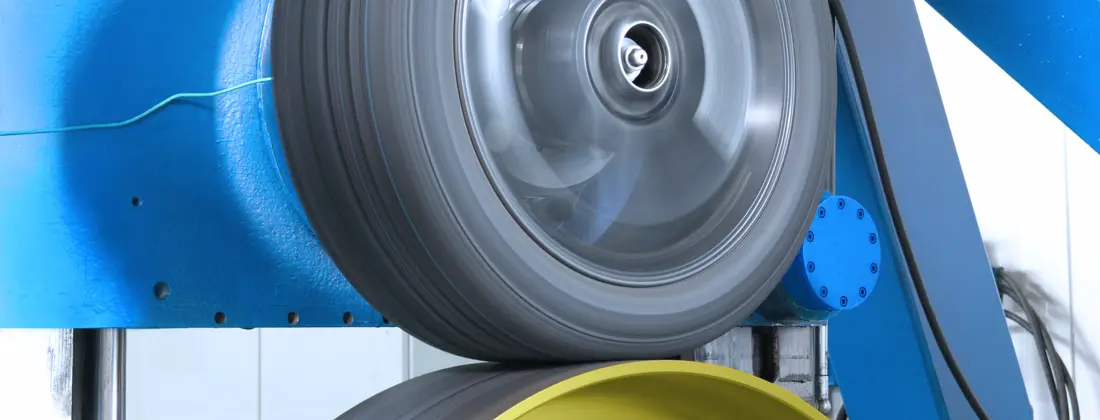AIS 110 Tyre Rolling Resistance Performance Test
The AIS 110 tyre rolling resistance performance test is a crucial procedure in the automotive sector, designed to evaluate how efficiently tyres convert energy into forward motion. This test is essential for manufacturers aiming to meet stringent fuel efficiency standards and enhance vehicle performance. The standard ensures that tyres perform consistently across various road conditions while minimizing energy loss due to friction.
The rolling resistance of a tyre plays a significant role in the overall fuel consumption of vehicles, impacting both environmental impact and operational costs. By reducing this resistance, tyres contribute positively towards sustainable transportation practices. The AIS 110 test measures the force required to roll a standardised tyre over a specified distance at controlled speeds under laboratory conditions.
The testing process involves mounting the tyre on a specially designed rolling resistance machine that simulates real-world driving scenarios. During the test, various parameters such as temperature, inflation pressure, and load are closely monitored to ensure accurate results. The outcome provides manufacturers with detailed insights into their product’s performance, aiding in continuous improvement.
The ISO 28196 standard outlines the procedures for this type of testing, ensuring consistency across different laboratories worldwide. Compliance with these standards is critical for both domestic and international markets, as it guarantees that tests are conducted under uniform conditions, leading to reliable comparisons between tyre models from various manufacturers.
Understanding rolling resistance helps identify areas where improvements can be made in materials science and design. For instance, incorporating low-rolling-resistance compounds or optimizing the tread pattern can significantly reduce energy loss during operation. Such advancements not only contribute to better fuel efficiency but also extend tire durability, enhancing overall vehicle performance.
In addition to its role in improving fuel economy, the AIS 110 test has broader implications for safety and comfort. Lower rolling resistance translates into smoother rides by reducing vibrations transmitted through the suspension system. Moreover, it contributes positively towards reducing greenhouse gas emissions from vehicles, aligning with global efforts aimed at combating climate change.
For manufacturers developing new tyre technologies or refining existing ones, regular testing according to AIS 110 ensures that innovations are effectively implemented and meet regulatory requirements. This process fosters innovation by providing valuable feedback on how different design choices impact performance metrics like rolling resistance.
The importance of accurate and consistent measurements cannot be overstated when it comes to tyre development. Laboratories equipped with state-of-the-art facilities play a pivotal role in ensuring that tests conducted adhere strictly to international standards such as ISO 28196. By adhering rigorously to these protocols, laboratories maintain credibility within the industry while contributing significantly towards advancing sustainable transportation solutions.
Manufacturers seeking certification under specific regulations often rely on third-party testing agencies like ours for independent validation of their products' compliance with relevant standards. Our expertise lies not only in conducting reliable tests but also in providing comprehensive reports that highlight strengths and opportunities for improvement based on the test results.
Industry Applications
- Automotive manufacturers seeking to comply with stringent fuel efficiency standards.
- R&D departments looking to optimize tyre designs and materials for reduced rolling resistance.
- Procurement teams evaluating suppliers' performance against industry benchmarks.
- Sustainability-focused organizations aiming to reduce environmental impact through improved tyre technology.
- Regulatory bodies ensuring compliance with international standards governing tyre performance.
Why Choose This Test
The AIS 110 tyre rolling resistance performance test offers numerous advantages that set it apart from other evaluation methods. Firstly, its precision in measuring the force required to roll tyres ensures accurate comparisons between different models and brands.
Secondly, compliance with international standards like ISO 28196 adds credibility both domestically and internationally, making results universally acceptable across diverse markets. This consistency is particularly beneficial for companies operating globally or those participating in export-oriented business activities.
The test's ability to simulate real-world driving conditions provides manufacturers with realistic insights into their product’s performance under various scenarios. This translates directly into better-informed decision-making processes during product development and refinement stages.
Moreover, the test supports sustainability initiatives by identifying opportunities for reducing energy consumption without compromising on safety or comfort levels. It promotes innovation in tyre technology through rigorous evaluation criteria that encourage continuous improvement based on scientific evidence rather than anecdotal observations.
The comprehensive nature of AIS 110 ensures that all aspects relevant to rolling resistance are covered, providing a holistic view of the tyre's performance characteristics. This includes not only static measurements but also dynamic assessments under varying loads and speeds, offering deeper insights into how different factors interact within real-world environments.
By choosing this test, stakeholders gain access to detailed reports that go beyond mere compliance data. These documents offer actionable recommendations tailored specifically for each client's unique needs, whether it be improving fuel efficiency, enhancing safety features, or optimizing production processes.
Use Cases and Application Examples
The AIS 110 tyre rolling resistance performance test finds application in several key areas within the automotive industry. One primary use case involves R&D departments exploring innovative materials or designs aimed at reducing rolling resistance.
In this context, the test helps identify optimal combinations of rubber compounds and tread patterns that offer superior fuel efficiency without sacrificing traction or durability. Another significant application pertains to quality control processes where manufacturers need to ensure consistent performance across all produced units.
For example, during mass production runs, regular testing ensures that each tyre meets the specified standards set by regulatory bodies like ISO 28196. This consistency is crucial for maintaining brand reputation and customer satisfaction.
AIS 110 also plays a vital role in supplier evaluations conducted by procurement teams looking to source high-quality tyres from reliable vendors. By comparing test results side-by-side, companies can make informed decisions about which suppliers best meet their quality expectations.
Additionally, this test supports sustainability programs focused on reducing the carbon footprint associated with tyre manufacturing and usage. Through continuous monitoring of rolling resistance levels throughout product lifecycle stages, manufacturers can track progress towards achieving environmental targets set forth by various initiatives globally.





